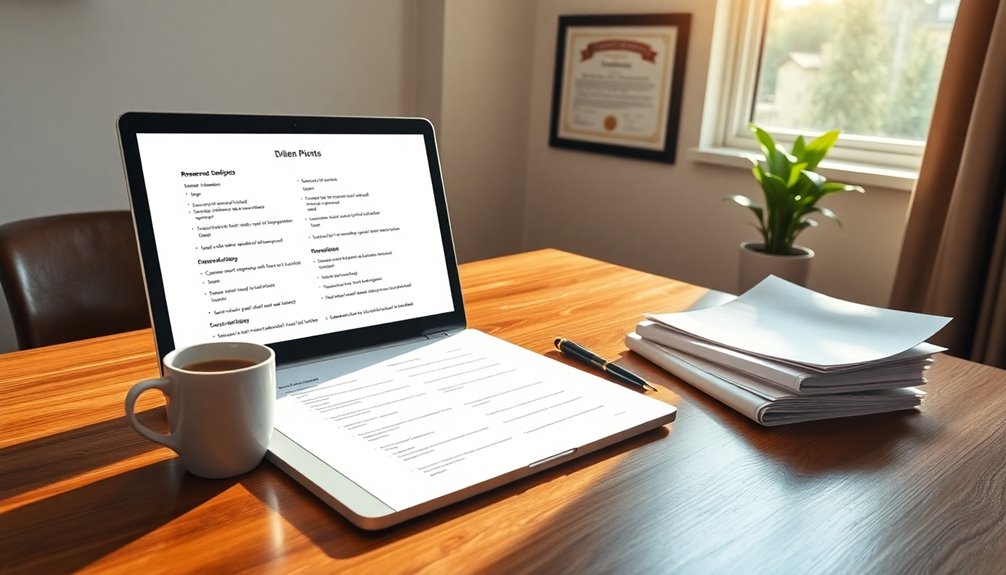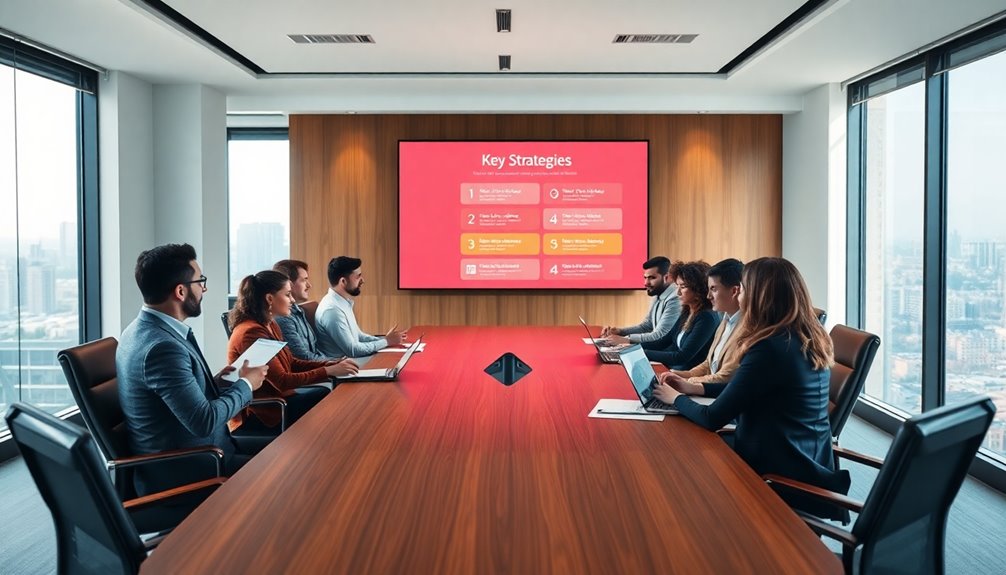To master essential interview skills, you need to prepare thoroughly and communicate effectively. Start by researching the company and the role to understand what's expected. Practice common interview questions using the STAR method to articulate your experiences clearly. Arrive punctually and dress appropriately to make a strong first impression. During the interview, focus on your verbal and nonverbal communication—listen actively and engage with your interviewer by addressing them by name. Don't forget to follow up with a thank-you email to reinforce key points discussed. Keep honing these techniques, and you'll discover even more ways to succeed.
Key Takeaways
- Conduct thorough research on the company and role to tailor your responses effectively during the interview.
- Practice common interview questions using the STAR method to articulate your experiences clearly.
- Arrive early and dress appropriately to convey professionalism and reliability.
- Master both verbal and nonverbal communication to foster a strong connection with the interviewers.
- Follow up with a personalized thank-you email to reinforce your interest and recap key discussion points.
Understanding Interview Skills

Mastering interview skills is essential for maneuvering the job market effectively. You need to understand that these skills involve more than just answering questions; they require comfort in discussing your qualifications and experiences.
You'll find that interview skills can range from traditional techniques to more innovative approaches, so being adaptable is key. Confidence plays a huge role, too; when you're sure of yourself, it shows.
Preparing thoroughly allows you to convey your strengths clearly. Focus on presenting your skills in a structured manner, making it easier for interviewers to see your fit for the role. Additionally, demonstrating strong communication skills enhances clarity and builds rapport with your interviewers.
Research and Preparation

Thorough research and preparation are essential for acing your interview. Start by diving into the company's website, press releases, and social media to understand its culture, values, and recent developments.
Reach out to current employees for insights that mightn't be available online. Review the job listing in detail, familiarizing yourself with the required skills and responsibilities.
Prepare answers for common interview questions, especially those about your experience and skills. Use the STAR method for structuring your responses, making sure you highlight relevant examples.
Finally, revisit your resume and cover letter to verify consistency in your narrative. All this groundwork will boost your confidence and show interviewers you're genuinely interested in the position.
Professionalism and Punctuality

Demonstrating professionalism and punctuality can set you apart during an interview. Arriving at least 15 minutes early shows your reliability and respect for the interviewer's time.
Plan your outfit and materials the night before to avoid last-minute stress. Make certain you have reliable transportation to prevent any delays. Dress in clean, pressed clothing that fits the company's culture; when in doubt, opt for formal attire.
Furthermore, using professional language and being polite to everyone you meet—regardless of their position—reflects well on you. Remember, first impressions matter, and exhibiting professionalism can greatly impact how interviewers perceive you.
Communication Skills

After establishing your professionalism and punctuality, effective communication skills can further enhance your interview performance. Mastering verbal, written, and nonverbal communication is essential.
Address interviewers by name to create a connection and prepare small talk to ease into the conversation. Active listening is key; focus entirely on the interviewer's message and use paraphrasing to confirm your understanding. Pay attention to their nonverbal cues for additional context.
Maintain a balanced tone, avoid filler words, and keep your answers concise and relevant. Practicing these skills helps you articulate your thoughts clearly and connect better with your interviewer, making a lasting impression. Additionally, incorporating audience engagement strategies can significantly improve your interaction quality during the interview.
Building Confidence

Confidence is an essential ingredient for acing interviews, as it shapes how interviewers perceive you. To build your confidence, start by practicing your responses to common questions. The more familiar you're with your answers, the more at ease you'll feel.
Visualize your success before the interview; imagine yourself walking in, engaging with the interviewer, and leaving a great impression. Pay attention to your body language—maintain eye contact, use open gestures, and avoid crossing your arms.
Monitor your posture to project professionalism and approachability. Remember, confidence isn't just about feeling good; it's about conveying assurance in your abilities.
Answering Questions

How can you effectively convey your skills and experience during an interview? Use the STAR method—Situation, Task, Action, Result—to structure your responses. This approach helps you provide clear, specific examples that illustrate your qualifications.
Keep your answers concise and relevant, focusing on key points without rambling. If you're unsure about a question, don't hesitate to ask for clarification; it shows you're engaged.
Acknowledge both your strengths and areas for improvement, framing weaknesses as opportunities for growth. Stay calm when faced with tough questions and consider using humor to ease tension.
Ultimately, your ability to articulate your experiences confidently will leave a lasting impression on the interviewer. Additionally, practicing techniques like visualization and affirmations can enhance your confidence and performance leading up to the interview.
Follow-Up Etiquette

Following your interview, it's important to keep the momentum going by engaging in thoughtful follow-up etiquette.
Send a thank-you email within 24 hours to express appreciation for the opportunity and recap key discussion points. This not only shows your gratitude but also reinforces your interest in the position.
Personalize your message to reflect specific topics discussed during the interview, making it memorable. Keep your tone professional and concise, avoiding overly casual language.
If you haven't heard back after a week or two, consider sending a polite follow-up email to inquire about the status of your application. This shows persistence and enthusiasm, traits that employers value.
Frequently Asked Questions
What Should I Do if I'm Late for an Interview?
If you're late for an interview, try to stay calm and don't panic.
Contact the interviewer or the company to inform them of your delay and provide an estimated arrival time.
Once you arrive, apologize sincerely for the inconvenience without dwelling on it.
Focus on showcasing your skills and qualifications during the interview.
How Can I Handle Cultural Differences in Interviews?
To handle cultural differences in interviews, you should first research the company's culture and values.
Be respectful and open-minded, recognizing that communication styles may vary. When responding, use clear language and avoid idioms that might confuse others.
Actively listen to your interviewer and observe their body language. If uncertain about something, don't hesitate to ask for clarification.
Ultimately, showing respect and adaptability will help bridge cultural gaps effectively.
Should I Bring a Portfolio to the Interview?
Think of your portfolio as a treasure chest, brimming with your skills and achievements, ready to impress.
Yes, you should bring a portfolio to the interview. It showcases your work and provides tangible proof of your abilities.
When you share it, you're painting a vivid picture of your experience. Make certain it's organized and highlights your best projects, making it easy for interviewers to see why you're the perfect fit for the position.
What if I Don't Have Relevant Experience?
If you don't have relevant experience, focus on transferable skills from previous roles or activities.
Highlight your adaptability, problem-solving abilities, and any volunteer work that showcases your strengths.
Share examples that demonstrate your enthusiasm for learning and growing in the new role.
It's also helpful to connect your passion for the industry with the company's goals.
Show them you're enthusiastic to contribute and capable of quickly getting up to speed.
How Can I Follow up if I Haven't Heard Back?
Imagine the anticipation hanging in the air, waiting for a response.
If you haven't heard back after an interview, follow up with a polite email. Keep it brief; express your appreciation for the opportunity and reiterate your interest in the role.
Timing matters, so aim to send this within a week. This gentle nudge not only shows your enthusiasm but also keeps you fresh in the interviewer's mind, like a vibrant bloom in spring.
Conclusion
In the job interview world, think of yourself as a performer stepping onto a stage. Just like an actor rehearses lines and cues, you need to prepare and practice your responses. A recent study found that 70% of interviewers appreciate candidates who ask thoughtful questions, showing genuine interest. By mastering these essential skills, you'll not only shine in your performance but also leave a lasting impression, making you the standout star in the hiring process.









